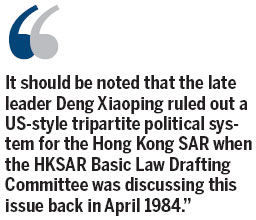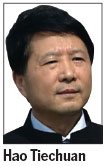HK system not tripartite
Updated: 2013-11-01 07:06
By Hao Tiechuan(HK Edition)
|
|||||||
I published an article entitled "Why Hong Kong's political system is not a 'separation of the three powers'" in the Aug 31 issue of Mirror magazine. A fellow commentator later responded in his column in a local newspaper that he agreed with me that Hong Kong's political system is executive-led, but insisted that Hong Kong's executive-led political system is under the "separation of the three powers (executive, legislative and judiciary)". I have to say I cannot agree with him on the "tripartite" notion, because it does not comply with relevant stipulation of the Basic Law. About this particular distinction Sung Siu-chong has provided a thorough explanation in his doctorate thesis - "On the relationship between the central government and the SAR government under the 'One Country, Two Systems' principle". Here I would like to borrow some of the research done by others with a few of my own views to elaborate on it.
For a start, Hong Kong's existing political power structure is different from the "tripartite" format of the US because the Basic Law allows the Chief Executive (CE) to override the Legislative Council (LegCo) and the High Court and answers directly to the Central People's Government. According to the Basic Law, the CE reports directly to the central government and is responsible for carrying out the instructions from the central government on matters defined in the Basic Law as under central jurisdiction; and handles on behalf of the SAR government foreign affairs and other matters authorized by the central government. Meanwhile, the LegCo and judiciary in Hong Kong do not answer directly to the National People's Congress (NPC), the central government or the Supreme People's Court. By defining Hong Kong's political system as executive-led government under the "tripartite" format, it would mean that instructions from the central government can be challenged by LegCo and/or the High Court. This is apparently in conflict with the Basic Law on the CE answering directly and accountable directly to the central government.

Second, the tripartite political system refers to a power structure with three wings operating parallel to one another in a check-and-balance relationship, while Hong Kong's version does not put the three in a parallel relationship. In Hong Kong, the CE answers directly to the central government while LegCo, though not directly under the NPC, faces the reality that a law it has passed could be scrutinized and even sent back by the NPC for a review; and the NPC Standing Committee has the power to review any interpretation of the Basic Law by Hong Kong's judiciary, which does not have any authority over actions taken by the central government, the NPC, the Supreme People's Court or the Supreme People's Procuratorate. Thus the three powers in Hong Kong cannot form an equal structure and serve as check and balance to one another.
It should be noted that the late leader Deng Xiaoping ruled out a US-style tripartite political system for the Hong Kong SAR when the HKSAR Basic Law Drafting Committee was discussing this issue back in April 1984. He criticized the tripartite proposal in a meeting with members of the drafting committee and emphasized Hong Kong "must not copy the Western system or the US version as-is. The existing system in Hong Kong today is not the same as Britain's, or the US's for that matter. And it has existed for one-and-a-half centuries now. If the existing system is replaced by the British or US format just to get a label of democracy, I'm afraid it's not such a good idea." The drafting committee explained to the press the next day that the "tripartite" system mentioned earlier was not really what the term means. Instead it refers to judicial independence with the executive and legislative branches of the SAR government maintaining a cooperative relationship and serving as check and balance to each other. And the term "tripartite political system" was used only because a simple and clear description was not available for the press to use at that moment. Indeed the term was never mentioned again in official deliberations of the drafting process or the Basic Law itself.

The British side gave its endorsement to the above-mentioned description of the future political system in Hong Kong in an official document presented to the Chinese side concerning the drafting of the Basic Law in 1987. The presentation also suggested the powers of the CE should include most of those held by the governor of the colonial government, particularly the power to approve or reject laws passed by the legislature and to dissolve the legislature. Because of these important notes, the drafting committee soon turned their focus to how best to convert the colonial-era political system and fit it into the future SAR in an innovative fashion with an eye on achieving democracy without abandoning everything from the previous administration. The end result of this thinking is a political system that has kept some of the colonial government features but reformed them to suit the needs of the HKSAR government.
The author is director for publicity, culture and sports affairs of the Liaison Office of the Central People's Government in the HKSAR. This is an excerpted translation of his commentary published in Ming Pao on Oct 31.
(HK Edition 11/01/2013 page9)